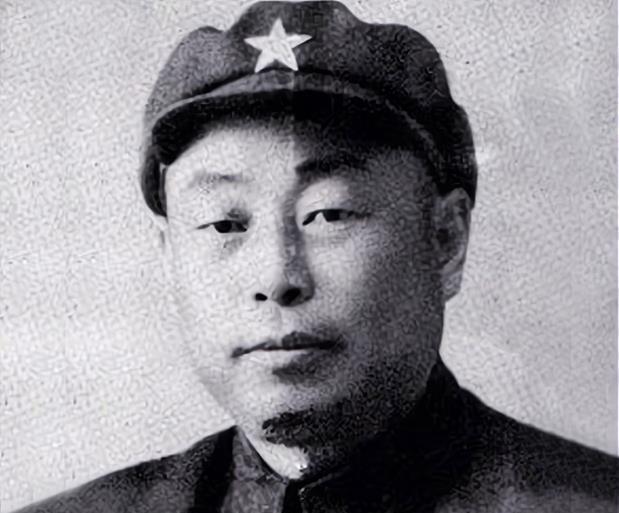During the War of Resistance Against Japanese Aggression, there was a saying circulating in the Sulu Yuwan Anti-Japanese Base Area: "If the sky is not afraid, it is afraid to meet Boss Hu." So, who is this so-called "Boss Hu"? How did he make the Japanese hypocritical heart palpitate, and what happened to him later?

This "Boss Hu" is called Hu Bingyun.
Hu Bingyun was a native of Nanchong, Sichuan, born in 1911, because he did not have enough to eat at home, he joined the army at the age of 17, and later became a soldier in the 7th Mixed Brigade of the Kuomintang 28th Army, a famous general in the early days of the Red Army, and in 1929, he accompanied the brigade commander Kuang Jixun in the Niujiaogou Uprising in Pengxi, Sichuan, and became a member of the "First Route Army of the Chinese Workers' and Peasants' Red Army in Sichuan". Soon after, the rebel troops were scattered, and Hu Bingyun had no choice but to look for the Red Army for a while, so he could only first join the Kuomintang 29th Army to solve the stomach problem and wait for the opportunity to return to the Red Army.
In 1932, when Hu Bingyun was driving with his troops to southern Shaanxi, he encountered the Red 20th Division at Bashan, and he took the opportunity to run to the Red Army to ask for a return to the army. However, soon after Hu Bingyun rejoined the Red Army, he was imprisoned by the Red 4 army protection bureau, and it turned out that his old brigade commander Kuang Jixun was designated by Zhang Guotao as a "reorganization faction", and he was also implicated as an old subordinate. He was also implicated as a low-level soldier, and it seemed like a joke. Later, the comrades of the Security Bureau also felt that this was not very appropriate, so they released him and made him a commander and a company instructor of the Red 33rd Army.
In June 1935, after the Red Fourth Front met the Red Front in Maogong and the Red Army in Sichuan, Hu Bingyun's unit was incorporated into the Red Front, serving as the commander of the 6th Company of the 4th Regiment of the 2nd Division of the Red 1st Army. The predecessor of the Red 4 Regiment was the Ye Ting Independent Regiment, which was a heroic unit, and in the Long March, the Red 4 Regiment served as the vanguard of the whole army many times, breaking through the barriers and winning the generals, making great contributions to the victory of the Long March. Of course, Hu Bingyun's performance was also remarkable, especially in the battle to capture Lazikou, he personally led the death squad to kill the enemy bravely, and finally killed a bloody road, which opened a passage for the Shaanxi-Gansu detachment of the Red Army to go north.
After the outbreak of the War of Resistance Against Japanese Aggression, Hu Bingyun's Red 4th Regiment was reorganized into the 1st Battalion of the 685th Regiment of the 343rd Brigade of the 115th Division of the Eighth Route Army, with Hu Bingyun serving as the deputy battalion commander and battalion commander, and after participating in the Pingxingguan Victory, he was transferred to the 1st Brigade Commander of the Suluyu Detachment, the commander of the 1st Regiment of the 115th Division, and the commander of the 19th Regiment of the 7th Brigade of the 3rd Division of the New Fourth Army.
In the struggle against Japan, Hu Bingyun's troops, who advanced into the Sulu-Yu-Anhui Border Region, fought bravely, fought fiercely, fought to the death, and attacked the city for a time. Later, according to General Hu Lao's own recollection, the first battle was fought in a watermelon field in Weiwa, Suining, Jiangsu Province, where the Japanese army cried wolf, and three drivers drove away, eliminating eighty Japanese troops; the second time was at FengMiao, Lingbi County, Anhui Province, he sent scouts to disguise themselves into the city, burned the central artillery tower of the Japanese army, and eliminated more than twenty Japanese troops; later, he blocked the reinforcement of the Japanese convoy, burned more than twenty Japanese cars, and eliminated more than a hundred Japanese troops. In this way, they immediately beat up morale, played with prestige, and played an impact.
Later, there was a folk proverb in the local area that "the sky is not afraid, I am afraid of encountering Boss Hu.", and as soon as those Japanese and pseudo-recalcitrant troops heard that the "Hu Brigade" of "Boss Hu" had come, they all avoided it early, lest they hurt themselves. Local armed forces and armed engineering teams will often carry out activities under the name of "Hu Brigade".
So, what happened to "Boss Hu" Hu Bingyun later?
After the victory of the War of Resistance Against Japanese Aggression, Hu Bingyun successively served as brigade commander of the 2nd Brigade of the Central Soviet Military Region, chief of staff of the Military Region, deputy commander and chief of staff of the 7th Column of the Central China Field Army, commander of the 11th Column of the East China Field Army, and commander of the 29th Army of Sanye, and was awarded the rank of major general in 1955. On February 28, 1996, General Hu Bingyun died at the age of 85. According to his will and testament, the ashes of the general were sent to the "Liu Laozhuang Eighty-Two Martyrs" cemetery in Huaiyin, Jiangsu Province, for burial, accompanying the comrades who died in the War of Resistance Against Japan.